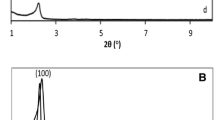Abstract
The coking during propene oligomerisation and subsequent regeneration of both silica-supported heteropoly acid H3PW12O40 (PW) and its palladium-modified form (1.6–2.5 wt% Pd) have been studied. 31P MAS NMR studies have revealed that the Keggin structure of the catalyst was unaffected by coke deposition in both unmodified PW/SiO2 and Pd-modified form. As shown by 13C MAS NMR and TGA/TPO, the Pd modification affects the nature of the coke formed: for the standard catalyst (PW/SiO2) both soft coke, comprising mainly high molecular weight aliphatic oligomers, and hard coke, comprising polynuclear aromatics, are formed whilst on the Pd-modified catalyst only the soft coke is observed. Coke formation causes strong deactivation of the catalyst in the oligomerisation of propene. The aerobic burning of coke on the unmodified PW/SiO2 occurs in the temperature range of 470–520°C. Doping the catalyst with Pd significantly decreases this temperature to allow catalyst regeneration at temperatures as low as 350°C without loss of catalytic activity.
Similar content being viewed by others
References
I.V. Kozhevnikov, Chem. Rev. 98 (1998) 171.
Y. Izumi, K. Urabe and M. Onaka, Zeolite, Clay and Heteropoly Acids in Organic Synthesis (Kodansha/VCH, Tokyo, 1992).
I.V. Kozhevnikov, Catal. Rev. Sci. Eng. 37 (1995) 311.
T. Okuhara, N. Mizuno and M. Misono, Adv. Catal. 41 (1996) 113.
M. Misono and N. Nojiri, Appl. Catal. 64 (1990) 641; K. Sano, H. Uchida and S. Wakabayashi, Catal. Surveys Jpn. 3 (1999) 55.
J. Barbier, Stud. Surf. Sci. Catal. 34 (1987) 1.
E. Furimsky and F.E. Massoth, Catal. Today 17 (1993) 537.
V.F. Chuvaev, K.I. Popov and V.I. Spitsyn, Dokl. Akad. Nauk SSSR 255 (1980) 892.
M. Seapan and Z. Guohui, in: Characterization and Catalyst Development, ACS Symp. Series, Vol. 411, eds. S.A. Bradley, M.J. Gattuso and R.J. Bertolacini (Am. Chem. Soc., Washington, DC, 1989) ch. 9.
J.S. Vaughan, C.T. O'Connor and J.C.Q. Fletcher, J. Catal. 147 (1994) 441.
I.V. Kozhevnikov, K.R. Kloetstra, A. Sinnema, H.W. Zandbergen and H. van Bekkum, J. Mol. Catal. A 114 (1996) 287.
D.J. Rawlinson and G. Sosmovsky, Synthesis (1973) 567.
I.V. Kozhevnikov, Russ. Chem. Rev. 52 (1983) 138.
N. Essayem, G. Coudurier, J. Vedrine, D. Habermacher and J. Sommer, J. Catal. 183 (1999) 292.
Author information
Authors and Affiliations
Rights and permissions
About this article
Cite this article
Siddiqui, M., Holmes, S., He, H. et al. Coking and regeneration of palladium-doped H3PW12O40/SiO2 catalysts. Catalysis Letters 66, 53–57 (2000). https://doi.org/10.1023/A:1019083103395
Issue Date:
DOI: https://doi.org/10.1023/A:1019083103395




